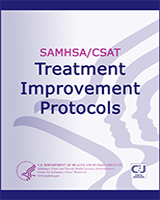From: Chapter 5—Breaking the Cycle: The Substance-Dependent Client as Parent/Caregiver

Substance Abuse Treatment for Persons with Child Abuse and Neglect Issues.
Treatment Improvement Protocol (TIP) Series, No. 36.
Center for Substance Abuse Treatment.
Rockville (MD): Substance Abuse and Mental Health Services Administration (US); 2000.
NCBI Bookshelf. A service of the National Library of Medicine, National Institutes of Health.